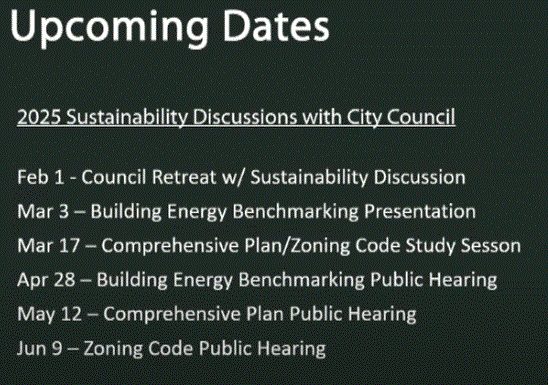City Council Wants More Done To Fight Climate Change
Most of Lakewood City Council is concerned that Lakewood will not reach net zero carbon emissions by 2050. Although Lakewood has been increasing climate change regulations and spending for over a decade, it’s not enough and the city will be increasing both spending and regulation in 2025.
Are these goals achievable and which programs are most effective?
Lakewood is still developing its model to predict emission reduction. It is almost impossible to attribute which programs result in the best emission reductions because every result is intertwined not only with other programs but with the existing climate, which by definition is changing.
Lakewood has more sustainability goals than surrounding cities. Lakewood is named “one of 119 cities across the globe providing leadership in environmental action and transparency by the Carbon Disclosure Project”, showing Lakewood is more aggressive than most of the world. The city is currently working on a new climate vulnerability study, a new sustainability plan, updating zoning codes and building codes for increased required sustainability measures. Votes on the new codes are scheduled for spring.
Full-time sustainability staff has increased from 2, in 2014, to 12 in 2025. Dozens more part-time staff are employed throughout all city departments. According to Sustainability and Community Development Director, Travis Parker, about 30% of the new comprehensive plan focuses on sustainability.
Despite already doing so much, every Council Member present asked about doing more during the November 18, 2024 Study Session on Sustainability.
The key to City Council goals was to secure more funding. Council Member Jeslin Shahrezaei points out that cities like Fort Collins and Denver have a dedicated sustainability budget. She says grants for one project at a time is not a long-term solution. She believes residents want more funding to go to sustainability efforts. According to Shahrezaei, Lakewood played a pivotal role in securing a regional $200M grant because it has the tracking numbers for emissions and workforce.
Council will talk about new revenue generating possibilities at the annual retreat workshop.
Council Member Paula Nystrom asked for a new program and budget for residential greenhouse gas emission reduction for the upcoming revised budget.
Lakewood has not asked residents to support the climate change fight directly with their pocketbooks before. Staffing initiatives often start as “free money” from other sources and continued past the grant’s expiration date without a public discussion. More direct taxing and funding suggestions represent a significant new direction for Lakewood, especially on the scale of new programs at millions of dollars a year.
Councilor Glenda Sinks was concerned about being able to track sustainability spending through the budget. This was a good question without a good answer. According to Director Parker, Lakewood is not showing much in the budget yet because it is in the “enviable place of having more money available than we have plans for yet but that won’t be the case for long.” There was no answer as to where the money is shown in the current budget.
Councilor Roger Low echoes the need for clear spending and goal tracking in the budget. He would like to see more progress on SolarApp implementation.
Council Member Sophia Mayott-Guerrero floated a new idea to expand the greenhouse gas fee and have a larger spending pool to be used for things like sidewalks, bike lanes, lighting, park maintenance, road maintenance, climate impact and water impact. All of these could be viewed as “sustainability” measures.
Several Councilors, including Cruz and Shahrezaei, were interested in making sure that money was distributed equitably. They want to make sure that low-income areas were first in line for assistance, as was intended through the federal program that Lakewood receives funding from.
Councilor Jacob LaBure would like to be a national leader in sustainability efforts. LaBure points out that much of the federal money may be lessening under a new administration. As a result, he suggests Lakewood do more internally. For instance, Lakewood may require garbage and waste contractors to only use contractors with EV vehicles. Mayor Strom echoes the benefits of buying or contracting EV vehicles companies. Councilor LaBure would like to mandate new buildings, especially city buildings, be LEED certified through the building code. Director Travis Parker says some buildings could already meet LEED standards but do not want to pay the quarter million dollars to get certified.
Councilor Rein would like to see more specificity in the sustainability plan in order to get Lakewood on track for less emissions. He is interested in the city getting a LEED certification. City staff say big new projects under city control, like the new maintenance facility, may not be able to get LEED certification but will be sustainable on some level. Rein asked staff if the current budget has enough funding to improve sidewalk connectivity and make the city more walkable in order to cut down on vehicle traffic. Staff answered there was not enough funding.

Tags: 2024, city-council, climate-change, Colorado, environment, Lakewood, news, sustainability, update-2024